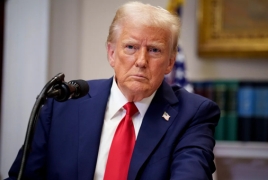Nobody knows what I will do, says Trump June 19, 2025 - 12:52 AMT PanARMENIAN.Net - U.S. President Donald Trump has refused to confirm whether he intends to launch a military strike against Iran, saying, “Maybe I will, maybe I won’t. Nobody knows what I’m going to do.” He indicated Iran still has the chance to abandon its nuclear program, despite Israel’s airstrikes. Trump said Iran had even proposed sending a delegation to the White House for nuclear talks in response to the Israeli attacks. “They offered to come to the White House. That’s bold, but not easy for them,” he added. “I told them it's too late to talk now. Maybe we’ll meet. There’s a big difference between a week ago and now.” Expressing frustration with diplomacy, Trump said, “I’m done with negotiations.” Still, he added that Iran could still make a deal—provided it surrendered “immediately and unconditionally.” Later, Trump stated Iran was “weeks away” from acquiring a nuclear weapon before the Israeli strikes. He stressed that his goal was not a pause but a decisive victory. “I don’t want war, but if the choice is between war and letting them have nukes, you do what you must. Maybe there won’t be a war. Maybe it ends quickly.” Reaffirming his stance, Trump said the U.S. seeks “not a ceasefire but total and final victory.” “You know what victory is? No nuclear weapons,” he emphasized. Asked whether Iran’s regime could collapse, Trump replied, “Of course, anything can happen. We have a plan for everything,” adding that he was about to meet with his advisors. He regretted that Iran had not accepted a deal before the 60-day deadline expired—Israel’s strikes began a day after that deadline. When asked why he shifted from talks to possible military action, Trump cited the impact of Israel’s initial strikes: “The first night was devastating. It really disrupted the other side.” Still, Trump said diplomacy was not off the table: “It’s never too late. Nothing is over until it’s over.” He added that the coming week would be critical: “Maybe even less than a week.” Asked about Iran’s Supreme Leader Ayatollah Ali Khamenei rejecting talks, Trump said, “I say good luck.” Iran’s mission to the UN dismissed Trump’s claim that Tehran wanted to send a delegation to the White House as “fabrication.” “No Iranian official has ever begged at the White House door. Only his cowardly threat to assassinate Iran’s Supreme Leader is more disgraceful than his lies,” it said. “Iran does not negotiate under pressure, does not accept peace under duress, and certainly not with a war criminal seeking attention,” the statement continued. Khamenei, on his official X account, wrote: “The fact that the American friends of the Zionist regime are intervening and making such statements is a sign of that regime’s weakness and incompetence.” Earlier, in his first public address since Israel’s attacks, the 86-year-old leader warned that any U.S. strike against Iran would cause “irreparable damage” to America and that Iran would not submit to Trump’s demands. Meanwhile, Iran’s Foreign Ministry summoned the Swiss ambassador, who represents U.S. interests in Tehran, to protest Trump’s “irresponsible and threatening” remarks. Although Tehran denies seeking nuclear weapons, its enrichment levels exceed civilian needs. Israel claims it has recently seen clear signs that Tehran is trying to build a bomb. Trump, who canceled the previous nuclear agreement in 2018, initially favored diplomacy but has moved closer to Jerusalem after the Israeli strikes and is now considering military involvement. Israeli Prime Minister Benjamin Netanyahu thanked Trump, saying, “We remain in contact, including last night—we had a very warm conversation.” Trump’s tougher rhetoric followed his call for Tehran’s 9.5 million residents to evacuate the city. He also cut short his trip to an international summit in Canada and returned to Washington for urgent consultations. At the same time, Trump mocked Russian President Vladimir Putin’s offer to mediate between Israel and Iran. He said he told Putin to “focus on Ukraine.” On June 13, Israel launched an airstrike campaign against Iran, targeting nuclear and missile facilities deemed immediate threats. Iran responded with deadly missile attacks on Israeli civilian and military targets. The U.S. has so far intervened only indirectly by helping intercept missiles fired at Israel, but it is now increasing its military presence in the region, and President Trump is reportedly considering direct involvement. Photo. Getty Images Azerbaijani authorities report that they have already resettled 3,000 people in the Nagorno-Karabakh town of Stepanakert. On June 10, Azerbaijani President of Azerbaijan Ilham Aliyev will leave for Turkey on a working visit. Azerbaijani President Ilham Aliyev arrived in Moscow on April 22 to hold talks with Russian counterpart Vladimir Putin. Authorities said a total of 192 Azerbaijani troops were killed and 511 were wounded during Azerbaijan’s offensive. Partner news |